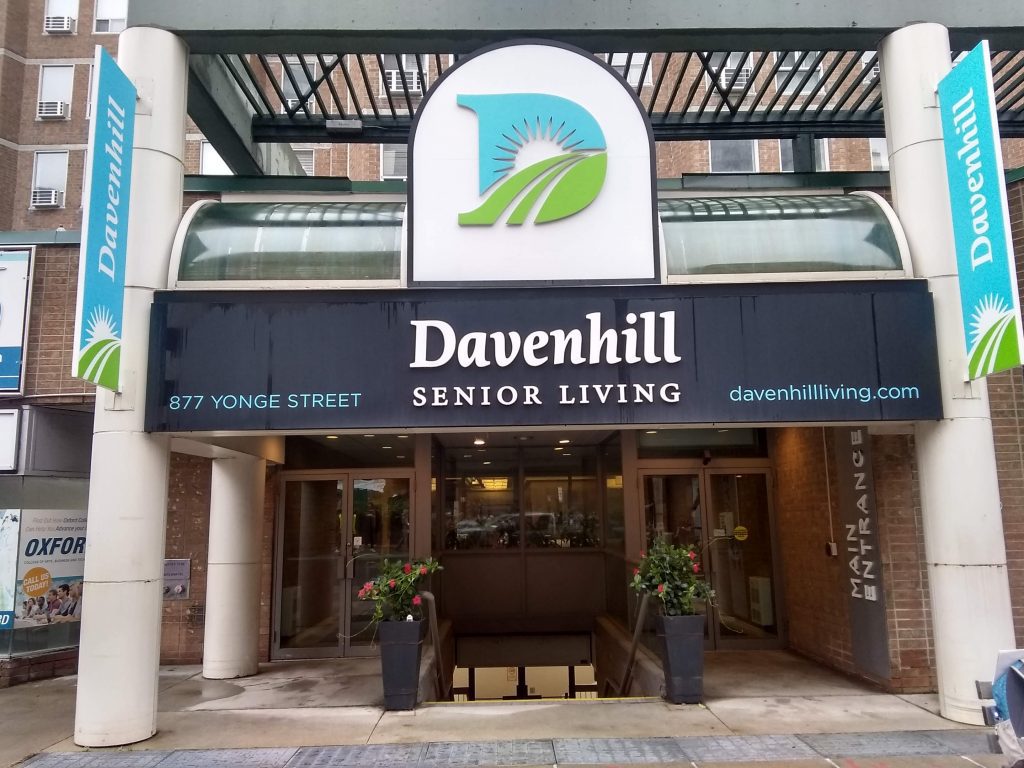Family members and residents continue in their fight for access to documents from the Retirement Homes Regulatory Authority (RHRA)

Betty Robinson, one of two residents left at a retirement home in Toronto’s Rosedale neighbourhood, is feeling both exhausted and frustrated ever since the facility’s abrupt closure under mysterious circumstances was announced.
Davenhill Senior Living, located at 877 Yonge St., announced the home’s closure — set for Nov. 30, 2019 — to its 150 residents in July.
“Some services and activities have ceased, some property has gone missing and/or been given away or sold. We do not believe any services should cease or any items be given away or sold until after the closing,” said Dianne Robinson, whose mother Betty, 97, has been living at Davenhill for five years.
The key document that Dianne and other family members are seeking is the 120-day transition plan that the Retirement Homes Act requires Davenhill to submit to the registrar of the RHRA. The plan contains information such as the distribution of assets, the reason for its closure, distribution of money made from sale, description of how the property will be used and more.
The new owner of the property has not yet submitted an application for zoning or building permits.
The Advocacy Centre for the Elderly (ACE), University-Rosedale NDP MPP Jessica Bell and Dianne Robinson each individually requested a copy of the 120-day transition plan, but the RHRA is prevented from sharing this information by law. Section 113 of the Retirement Homes Act states that the RHRA is required to “preserve secrecy with respect to any information obtained in performing a duty or exercising a power under the Act and shall not communicate the information to any person.” However, the home is permitted to make this information public if it chooses.
Davenhill is a non-profit retirement home that was sold for $30 million to a numbered company, 269518 Ontario Inc., in May. The company was incorporated less than two weeks prior to the day the sale was finalized.
The chair of Davenhill’s board of directors, Dan Tomlinson, sent out a letter on July 3, 2019, about its closure. “‘We took the decision only after it became clear that closure of the facility is inevitable’ following an extensive review,” he wrote.
According to Robinson, some residents had to move out of the province to find a place to stay on very short notice.
“What caused this? We’d like to know what extensive review was done. Was there a risk management that came in? Why is it inevitable that it’s closing?” she said.
Alexandra McCorkle, the daughter of Jean McCorkle, 100, had to drop everything when she learned about Davenhill’s closure, and travel from Florida to help her elderly mother with the relocation process. “There’s still some shock that hasn’t worn off, which protects you for a while from dealing with the reality. But underneath me, there’s a lot of anger after having to deal with stress and anxiety.”
Esaura Lopes, 84, who has been staying at Davenhill for about a year, echoed McCorkle’s sentiments, saying, “Explain to us why it is closing — that is called etiquette. We’re human beings, and above all, we are all human beings. Since July 4, 2019, we have been on a roller-coaster.”
“When you move into a new place, you’re groping to find what you’re familiar with, such as outlets and switches,” said Jean McCorkle, who is legally blind. “I’m sure there are other people like me, and it must be just as tough for them as it is for me.”
Clara McGregor, a lawyer from ACE, said at a July 18 meeting hosted by MPP Jessica Bell, that Davenhill appears to have complied with its legal obligation to revoke care services. “From a legal perspective, they can take away the care services, but it doesn’t automatically mean that residents have to leave. But functionally, some people also can’t live there if those services aren’t there,” McGregor said.
According to ACE, most retirement homes are governed by the Retirement Homes Act (RHA) and the Residential Tenancies Act (RTA), as well as the Ontario Human Rights Code.
For this reason, McGregor said the only way Davenhill can evict residents is to go to the Landlord and Tenant Board (LTB) and apply for an eviction permit that meets the requirements laid out in the RTA.
Bell pointed out the lack of transparency as a big problem. “Davenhill should have the responsibility to work ethically transparently with the residents,” she said. “This includes telling them that they have the right to stay, informing them if they accept help from the transitional coaches provided by Davenhill, they are no longer eligible for compensation. Davenhill didn’t do that.”
Judith Wahl, a former executive director of ACE, said the fundamental problem lies in the RHA and the reactive behaviour of the RHRA. “When they created the Retirement Homes Act, they didn’t listen to us who were being consulted. I think it was a poor model, which doesn’t take into account the reality,” she said.
Although Wahl brought this to the RHRA’s attention many times over other similar issues in the past, such as the retirement home charging incorrect rents, the RHRA often turned her away.
“[The] RHRA said it’s not their job to deal with it even though they have the duty to stop financial abuse,” Wahl said. “Not much has changed when it comes to protection of senior tenants, or enforcement of legislative framework despite the fact that regulatory authority exists. This is because nobody is acting as an oversight to the RHRA.”
Robinson says she thinks another important factor that should be put into consideration is access to counselling services. “Counselling is a priority. I was told by a family member whose parent is starting to have dementia about transition trauma, and the impact a move like this can have on people. It is very devastating. What kind of help are these people getting?”
Betty Robinson also believes that counselling services should be made available. “I’d like to ask questions to our insurance or management if we can seek counselling. None of us expected to be in this crisis. And it definitely is a crisis,” she said.
Dianne Robinson said her group of 25 members, which includes family members and former residents of Davenhill, feel there should be something done by the LTB, as Davenhill has not given residents a formal eviction notice as far as she knows. “Our concern is not just what’s happening now to our family members. We want to ensure that down the road, this doesn’t happen again,” she said.
Bell said Ontario MPPs have called for a review of the RHA, as a similar trend of evictions is happening across the province.
A representative from Davenhill Senior Living could not be reached for comment.
Correction, Nov. 14, 2019: A previous version of the story did not include information on why Davenhill’s 120-day transition plan was not released to the public.RHRA is prevented from sharing this information under the provisions of the RHA. This story also originally stated that the transition plan included information about the distribution of assets and distribution of money made from sales. This information was incorrect. We apologize for the mistake.
June Jang is a second-year master's of journalism student and an education reporter at the Ryersonian.


